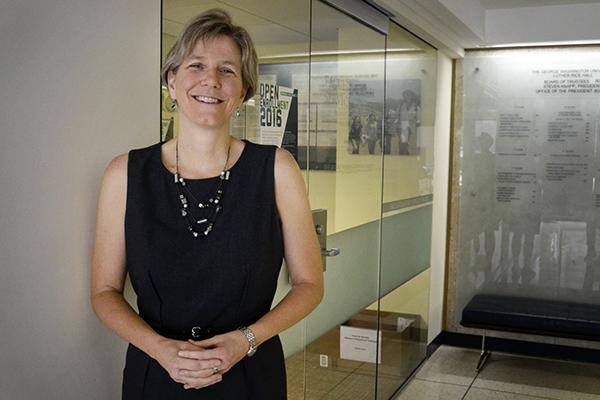Ten students from Atlanta, whittled down from a pool of more than 1,400 nominees, will attend GW on full-tuition scholarships next fall.
The University announced its partnership with the Posse Foundation, which sends students from the same regions to college in groups, last week. The partnership is an example of what experts call the right approach to affordability because it brings diverse and low-income students to campus in groups. When students have peers at school, they are more likely to feel supported and want to stay there – key indicators that a school could also see them graduate on time.
The partnership also fits in with University President Steven Knapp’s goal for the year: keeping students at GW. He said he wanted to make sure students felt connected on campus to improve GW’s graduation rate. And experts have said programs like the Posse Foundation can help.
Students are picked for the program even if their standardized tests scores are relatively low, but meet criteria like being a leader in the classroom setting. Family income level is not part of the consideration process.
The group will arrive after being prepped by Posse Foundation staff members to transition to college over eight months. That training will include lessons on writing at the college level and communicating with a new set of peers.
Senior Associate Provost for Enrollment Management Laurie Koehler said the program has been something officials have looked at for several years.
“From conversations with colleagues at other Posse partner institutions, it became clear that in addition to changing the students’ lives, the scholars themselves had a profound positive impact on their campus communities,” she said.
Koehler said 1,400 students were nominated by teachers, counselors or principals in the Atlanta area. A team from GW will select the scholarship recipients from a pool of 20 finalists, analyzing the students’ applications and holding in-person meetings with them. Staff from the Atlanta Posse chapter have visited campus, Koehler said, to help them decide which finalists are best fit for GW.
Koehler said 100 percent of the selected students’ demonstrated financial need will be met through a combination of institutional scholarships and grants, federal grants and loans, work study and family contributions.
The foundation has a prestigious national reputation, including a nod from President Barack Obama, who donated a portion of his Nobel Peace Prize award to the foundation in 2010.
In August, the University announced it would no longer require applicants to submit SAT or ACT scores, which officials said was an effort to promote economic diversity, though some experts said it is too early to tell if test-optional policies made universities more diverse.
In another access effort, staff in the admissions office help students at a D.C. high school fill out college applications last year.
Deborah Bial, president of the organization, said students from every public high school in the Atlanta area will have the opportunity to be nominated for the Posse program. She said GW “aligns with the values and mission of the Posse Foundation.”
Last year, Bial said less than 5 percent of students nominated for spots with the Posse Foundation were selected. After students are nominated, they compete for a spot through an assessment process that tests their ability to work with a team and solve problems.
Five of GW’s 14 peer schools are partnered with at least one of the foundation’s chapters in New Orleans, New York and Los Angeles, as well as Atlanta. Vanderbilt University, which works with the New York chapter, was the first school to admit Posse scholars in 1989.
Frances O’Connell Rust, the director of teacher education programs at the University of Pennsylvania Graduate School of Education, said the school has partnered with the Posse Foundation for a decade.
She said the program allows students who represent different cultural groups to arrive with the “social knowledge” they need to be successful in an elite school’s environment and to “develop a kind of security” over the course of their college career.
“Getting [to college] is a piece of the battle. Then it’s supporting through,” she said. “It’s not lowering your standards, it’s saying, ‘Here’s the standard. Here’s what we can do to help you.’”








